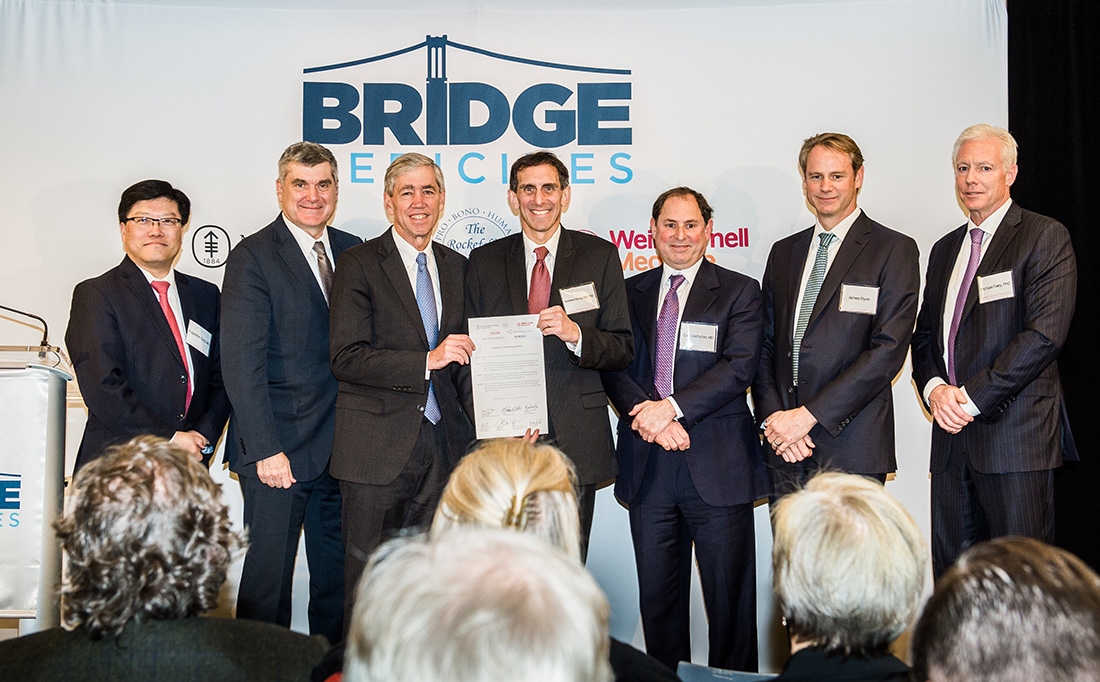Weill Cornell partners in innovative drug discovery company
By Anne Machalinski

Memorial Sloan Kettering Cancer Center, The Rockefeller University and Weill Cornell Medicine announced Oct. 31 that they have established a new drug discovery company called Bridge Medicines. Launched in partnership with Takeda Pharmaceutical Company Ltd. and health care investment firms Bay City Capital and Deerfield Management, Bridge Medicines will take ideas from concept to drug candidate to rapidly develop therapeutics to treat human diseases.
Bridge Medicines builds on the work of the independent, nonprofit Tri-Institutional Therapeutics Discovery Institute, known as Tri-I TDI. Scientists at the Tri-I TDI, which launched in 2013, are working in the laboratory on approximately 50 early-stage drug discovery projects – spanning infectious disease, oncology, neuropsychiatry and rare diseases – with the hope that they will be translated into future treatments for patients.
Research projects accepted into the Tri-I TDI will be able to graduate to Bridge Medicines, where they will be given financial, operational and managerial support to move from a validating, proof-of-concept study to an in-human clinical trial.
“The launch of Bridge Medicines is a truly exciting development in New York’s biotechnology space,” said Dr. Michael Foley, Sanders Director of the Tri-I TDI. “We’re tapping into the distinguished talent at Sloan Kettering, Rockefeller and Weill Cornell Medicine and offering entrepreneurs access to support what’s next in biopharmaceuticals. Bridge Medicines will enable us to advance promising projects farther down the development pipeline, providing new therapies to patients as quickly as possible.”
“Memorial Sloan Kettering has always had an unwavering commitment to the discovery and development of novel cancer drugs,” said Craig B. Thompson, president and CEO of Memorial Sloan Kettering. “Bridge Medicines will provide an innovative and unique opportunity to continue that commitment, with the goal of delivering the best drugs to patients in the shortest amount of time.”
“This unique academic-industry partnership advances the remarkable work of the Tri-I TDI, further extending the ability of basic scientists such as those at our three institutions to explore the full potential of their discoveries for the benefit of patients,” said Dr. Richard P. Lifton, president of The Rockefeller University. “We are thrilled to be a part of this initiative.”
“Bridge Medicines is a transformative concept for therapeutics development that will provide enormous hope to patients and incredibly exciting opportunities for researchers to take their discoveries into the clinic,” said Weill Cornell Medicine Interim Dean Augustine M.K. Choi. “Weill Cornell Medicine is honored to be part of this groundbreaking investment in medicine.”
“As we looked ahead and beyond the current research climate, we knew this flagship collaboration would continue to push the boundaries of what’s possible in medical research. The establishment of Bridge Medicines is that next phase,” said Dr. Andrew Plump, chief medical and scientific officer of Takeda Pharmaceutical Co. “Takeda is thrilled to be a partner in this innovative approach to further research and drug discovery for the benefit of more patients around the world.”
“To be part of this project, working alongside Takeda, Deerfield and three of the world’s leading research and clinical institutions in helping to advance translation research and build the New York City-based biotechnology infrastructure is a great honor,” said Carl S. Goldfischer, managing director of Bay City Capital.
“Harnessing the combined strengths of academic discovery, industrial know-how, capital and entrepreneurship, Bridge Medicines is a breakthrough in the translation of ideas into treatments,” said William Slattery, a partner at Deerfield. “As Bridge Medicines changes the paradigm of drug development, it can also help transform New York into a world-class center of biotechnology excellence. We at Deerfield look forward to collaborating with Takeda, our illustrious academic partners at The Rockefeller University, Memorial Sloan Kettering and Weill Cornell, and Bay City Capital in our mission to advance healthcare.”
In current drug-development models, intellectual property is often sold or licensed to a pharmaceutical company when it is still a basic compound or antibody. This early stage is fraught with risk; companies may choose to discontinue a project if it doesn’t meet expectations during the clinical trial process. The Tri-I TDI program reflects a different paradigm: Principal investigators collaborate with medicinal chemists from Takeda to demonstrate the therapeutic viability of new compounds through preclinical proof-of-concept studies.
Any project graduating from Tri-I TDI is eligible to enter Bridge Medicines, where it can continue along the drug development pipeline without interruption and be professionally managed in a venture capital setting.
Because Bridge Medicines projects are funded as a group, even some riskier – but potentially transformational – ideas can obtain financial support. The arrangement could shave a decade off of the typical process to go from a promising discovery to medical use.
Bridge Medicines makes this portion of the drug development pathway possible with the backing of its investing partners, who assist in the creation of the business and scientific development plans. Projects that are part of the Bridge Medicines portfolio would be supported through filing of an investigational new drug application with the U.S. Food and Drug Administration. Once that hurdle is passed, Bridge Medicines would work with the participating scientists to establish and fund biopharmaceutical companies responsible for managing individual projects and advancing them to clinical trials, with the intention of basing the new companies in New York City.
Anne Machalinski is a freelance writer for Weill Cornell Medicine.
Media Contact
Get Cornell news delivered right to your inbox.
Subscribe